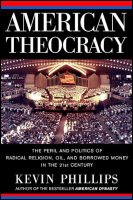American Theocracy by Kevin Phillips

The book with its subtitle is American Theocracy : The Peril and Politics of Radical Religion, Oil, and Borrowed Money in the 21stCentury. I started it
 with a great deal of enthusiasm but finished it with much less. I ended up feeling that this was an author with a harsh and bombastic voice, screaming to get his point made and not the quiet voice of a scholar researching historical parallels that have messages for the current time. I can’t blame Phillips in a way, because it’s well documented that lessons of past history rarely turn around current thinking, especially of politicians in power struggles. I don’t suppose that metaphorical yelling helps much though.
with a great deal of enthusiasm but finished it with much less. I ended up feeling that this was an author with a harsh and bombastic voice, screaming to get his point made and not the quiet voice of a scholar researching historical parallels that have messages for the current time. I can’t blame Phillips in a way, because it’s well documented that lessons of past history rarely turn around current thinking, especially of politicians in power struggles. I don’t suppose that metaphorical yelling helps much though.This book’s thesis concerns a threat to US hegemony by the Republican coalition that rules the US today, a coalition that Phillips sees as powerful, growing and dangerous. He discusses three facets of that coalition’s strength: (1) what he calls petro-imperialism, (2) fundamentalist religion focused on eschatology (“end times”) to the exclusion of the coming oil crisis, the deteriorating environment or the effect of debt on the US future and (3) the dominance of the financial sector today in the US. One assumes he considers the religious threat the most serious because of the title.
The book is developed by comparing three previous superpowers in their time: Spain with the wealth of its colonial empire in the Americas, followed by Holland which dominated the seas and built an Empire primarily in Asia, followed by Britain which used its coal, manufacturing capacity and sea power to dominate the world. He sees parallels to the situation of the US today in the situations that caused the fall of each of those superpowers. The historical part seems well researched, though he’s not nearly as comprehensive in his examination of the forces that cause downfalls as, say Jared Diamond, in Collapse, but then Phillips is not talking about civilizations that actually collapsed, only those that achieved world hegemony and then fell back into a lesser role. His discussions of fuel (wind and sail and coal before oil) are interesting, but except for Britain’s role in the Middle East when oil was first a factor in that region, not particularly powerful. His discussion of fundamentalist religion in the downfall of these powers seems relevant but not nearly as important as he makes it. However, his discussion of how civilizations in their “end stages” have been dominated by finance at the same time as their innovation in science and technology dwindled I found most enlightening.
I too find the role of fundamentalist religion in the US today worrisome, particularly when it causes people to believe that oil will be found because “God will provide” or to scorn environmental necessities because it’s near the Second Company anyway or when it encourages people to believe that Armageddon is right around the corner and will pit Christians against Muslims or something like that. I also dislike the President and, because I believe firmly in the separation of Church and State, am quite disturbed when he positions himself as doing what God has told him to do. But I don’t see the American people going for theocracy in the next election and I think Phillips relies pretty heavily on statements from fringe groups as scare tactics in this book. Which is not to say that I didn’t like the book and find much of his evidence compelling. It’s the metaphorical yelling that puts me off.
As I said I was most convinced by his analysis of the US financial position (debts public and private, dependence on the fact that oil trades in dollars which could change) and the growing power of the financial services sector of the economy. He talks about the credit card companies as holding millions of Americans in virtually “indentured servitude” particularly after the reform of bankruptcy laws which threaten to put creditors in thrall to the credit card companies for life. Next most convincing was his analysis of petro-imperialism, and weakest was the religious argument, though even there he had some statistics and demographics that caused me to sit up and take notice and many of his points were both well-documented and very troublesome.


0 Comments:
Post a Comment
<< Home